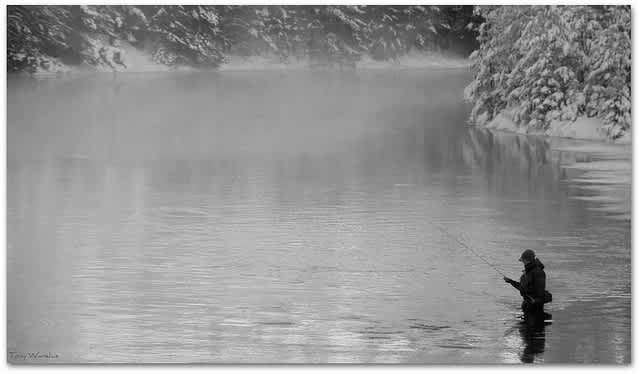Catching Cold-Water Bass
Hank Parker 01.11.12

Catching bass in cold water is one of the least understood topics in fishing. That doesn’t mean it’s always difficult, but it can be perplexing.
That’s probably because there is a lot of confusion in how we define cold water. In the south, for example, water below 55 degrees can make for tough fishing conditions. In the north, where bass are accustomed to lower water temperatures, fishing can be very good in water temperatures above 45 degrees.
The type of fish you pursue can make a difference, too. A bass’ metabolism drops in cold water, and that metabolism will dictate his level of activity. The largemouth bass tends to have a lower tolerance for cold water, whereas the smallmouth and spotted bass can be more active in low water temperatures.
I’ve fished for smallmouth in New York when water temperatures were in the low 40s and consistently caught fish. On the other hand, I fished a three-day tournament at West Point Lake, Ga. in the late 1970s when 65 top anglers only caught one fish in 45-degree water!
So, remember that there isn’t a universal water temperature at which fish are active or inactive. A lot depends upon the region of the country you’re fishing, the clarity of water and the type of fish in the lake.
Furthermore, it’s rare that the entire lake has the same temperature. During those late winter, early spring days, some sections of a lake may warm up faster. I’ve seen days when a minor change from 45 to 47 degrees made a difference in how many fish I caught.
To find those subtle changes, keep a watchful eye on your temperature gauge and key on the still-water bays on the north side of the lake. Calm water absorbs heat faster, and the northern shore benefits from the sun for a longer period of the day. That’s also why sunny afternoon hours tend to be more productive than early morning hours when the water is cold.
Water clarity can matter, too. Bass are more apt to move shallower in off-color water than they do in cold, clear water. As an added plus, stained water absorbs heat better, so if you can find still, off-color water, it’s probably going to be warmer and the bass will be more active.
That raises another misconception about cold water. Many fishermen believe bass stay deep in cold water. That’s usually true in clear water, but if the water dirties, the fish will be drawn shallower. I’ve caught bass from three-feet of water when the surface temperature was 50 degrees.
However, I’ve never caught a bass from real muddy water that was less than 50 degrees. It’s the absolute worst fishing condition. When that happens, look for pockets of clear water and work them slowly.
There are three lures that work best for me in cold water. The jig is my first choice, which I’ll fish slowly around sunny banks and heavy cover. I’ll flip it into each brush pile or along a dock piling three or four times trying to coax the fish into biting.
My second tactic would be to slow-roll a spinnerbait around trees that lie off steep banks. Fallen trees give bass the cover they need and a variance of depth. Whereas fish may be on the deep end of the tree in the morning, they may move up to the shallow end once the water warms in mid-day hours.
If I think the fish are away from the banks, I’ll use tight-wiggling crankbaits, such as Berkley Flicker Shad. Tight-wiggling crankbaits are more effective in cold water than those with wide wobbles.
Regardless of your lure choice, fish slowly and methodically. Your patience will be rewarded when you tempt a big bass by putting the lure on the end of his nose.

